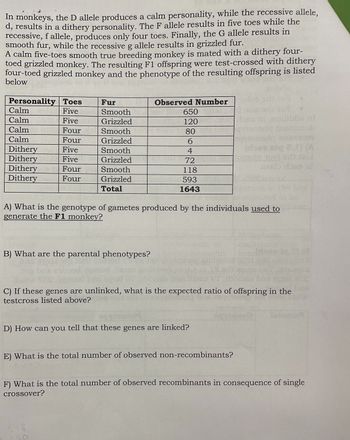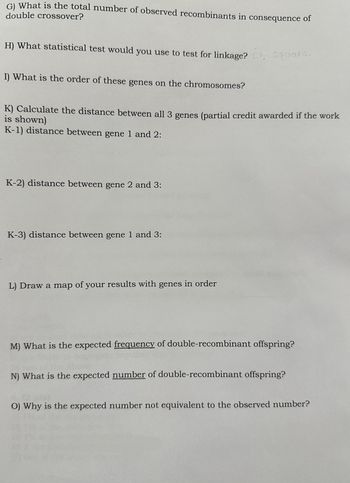
Human Anatomy & Physiology (11th Edition)
11th Edition
ISBN: 9780134580999
Author: Elaine N. Marieb, Katja N. Hoehn
Publisher: PEARSON
expand_more
expand_more
format_list_bulleted
Concept explainers
Topic Video
Question
Need help, please.
What are the answers to parts G, H, and I?

Transcribed Image Text:In monkeys, the D allele produces a calm personality, while the recessive allele,
d, results in a dithery personality. The F allele results in five toes while the
recessive, f allele, produces only four toes. Finally, the G allele results in
smooth fur, while the recessive g allele results in grizzled fur.
A calm five-toes smooth true breeding monkey is mated with a dithery four-
toed grizzled monkey. The resulting F1 offspring were test-crossed with dithery
four-toed grizzled monkey and the phenotype of the resulting offspring is listed
below
Personality Toes Fur
Five
Five
Four
Four
Five
Five
Four
Four
Calm
Calm
Calm
Calm
Dithery
Dithery
Dithery
Dithery
Smooth
Grizzled
Smooth
Grizzled
Smooth
Grizzled
Smooth
Grizzled
Total
Observed Number
B) What are the parental phenotypes?
650
120
80
6
4
72
118
593
1643
A) What is the genotype of gametes produced by the individuals used to
generate the F1 monkey?
mob
avizecom
esg 3.0) (A
Tuot odt sell
sasto ross ni
C) If these genes are unlinked, what is the expected ratio of offspring in the
testcross listed above?
D) How can you tell that these genes are linked?
E) What is the total number of observed non-recombinants?
F) What is the total number of observed recombinants in consequence of single
crossover?

Transcribed Image Text:G) What is the total number of observed recombinants in consequence of
double crossover?
H) What statistical test would you use to test for linkage? Chi square.
I) What is the order of these genes on the chromosomes?
K) Calculate the distance between all 3 genes (partial credit awarded if the work
is shown)
K-1) distance between gene 1 and 2:
K-2) distance between gene 2 and 3:
K-3) distance between gene 1 and 3:
L) Draw a map of your results with genes in order
M) What is the expected frequency of double-recombinant offspring?
N) What is the expected number of double-recombinant offspring?
O) Why is the expected number not equivalent to the observed number?
Expert Solution
This question has been solved!
Explore an expertly crafted, step-by-step solution for a thorough understanding of key concepts.
Step by stepSolved in 3 steps with 1 images

Knowledge Booster
Learn more about
Need a deep-dive on the concept behind this application? Look no further. Learn more about this topic, biology and related others by exploring similar questions and additional content below.Similar questions
- Need help, please.arrow_forwardIs this correct? Thanks.arrow_forwardPlesae ASAP. thanku Which of the following is not true about the glutamate family of ligand-gated ion channels? a. members are AMPA, kinase, and NMDA channels b. they are cation permable c. channels subunits have 3 full transmembrane doamins d. they require 5 subunits to amke a functional channelarrow_forward
- C, D correct answer. I need explanation. Asaparrow_forwardDear Expert. Thank you for your advice, which is good and helpful. I note that your answer is "when 3 binding sites have been occupied the activity of these receptors is maximum." However, I also note that for a similar question (see below) on α7 nicotinic Acetylcholine Receptor (nAChR) also gives the same answer, ie. at least 3 agonist binding sites should be occupied. Another Question - "To maximize the activity of an α7 nAChR, how many agonist binding sites should be occupied." I understand that in α7 nAChR, binding to two sites is more effective and binding to three sites is most effective for activation. On the other hand, binding to four or five sites in the nAChRs of chromosome 7 speeds up desensitization more than activation. Therefore, to maximize the activity of an α7 nicotinic Acetylcholine Receptor (nAChR) is also "3 sites". Am I right?arrow_forwardPlease ASAP. Thank you.arrow_forward
arrow_back_ios
arrow_forward_ios
Recommended textbooks for you
 Human Anatomy & Physiology (11th Edition)BiologyISBN:9780134580999Author:Elaine N. Marieb, Katja N. HoehnPublisher:PEARSON
Human Anatomy & Physiology (11th Edition)BiologyISBN:9780134580999Author:Elaine N. Marieb, Katja N. HoehnPublisher:PEARSON Biology 2eBiologyISBN:9781947172517Author:Matthew Douglas, Jung Choi, Mary Ann ClarkPublisher:OpenStax
Biology 2eBiologyISBN:9781947172517Author:Matthew Douglas, Jung Choi, Mary Ann ClarkPublisher:OpenStax Anatomy & PhysiologyBiologyISBN:9781259398629Author:McKinley, Michael P., O'loughlin, Valerie Dean, Bidle, Theresa StouterPublisher:Mcgraw Hill Education,
Anatomy & PhysiologyBiologyISBN:9781259398629Author:McKinley, Michael P., O'loughlin, Valerie Dean, Bidle, Theresa StouterPublisher:Mcgraw Hill Education, Molecular Biology of the Cell (Sixth Edition)BiologyISBN:9780815344322Author:Bruce Alberts, Alexander D. Johnson, Julian Lewis, David Morgan, Martin Raff, Keith Roberts, Peter WalterPublisher:W. W. Norton & Company
Molecular Biology of the Cell (Sixth Edition)BiologyISBN:9780815344322Author:Bruce Alberts, Alexander D. Johnson, Julian Lewis, David Morgan, Martin Raff, Keith Roberts, Peter WalterPublisher:W. W. Norton & Company Laboratory Manual For Human Anatomy & PhysiologyBiologyISBN:9781260159363Author:Martin, Terry R., Prentice-craver, CynthiaPublisher:McGraw-Hill Publishing Co.
Laboratory Manual For Human Anatomy & PhysiologyBiologyISBN:9781260159363Author:Martin, Terry R., Prentice-craver, CynthiaPublisher:McGraw-Hill Publishing Co. Inquiry Into Life (16th Edition)BiologyISBN:9781260231700Author:Sylvia S. Mader, Michael WindelspechtPublisher:McGraw Hill Education
Inquiry Into Life (16th Edition)BiologyISBN:9781260231700Author:Sylvia S. Mader, Michael WindelspechtPublisher:McGraw Hill Education

Human Anatomy & Physiology (11th Edition)
Biology
ISBN:9780134580999
Author:Elaine N. Marieb, Katja N. Hoehn
Publisher:PEARSON

Biology 2e
Biology
ISBN:9781947172517
Author:Matthew Douglas, Jung Choi, Mary Ann Clark
Publisher:OpenStax

Anatomy & Physiology
Biology
ISBN:9781259398629
Author:McKinley, Michael P., O'loughlin, Valerie Dean, Bidle, Theresa Stouter
Publisher:Mcgraw Hill Education,

Molecular Biology of the Cell (Sixth Edition)
Biology
ISBN:9780815344322
Author:Bruce Alberts, Alexander D. Johnson, Julian Lewis, David Morgan, Martin Raff, Keith Roberts, Peter Walter
Publisher:W. W. Norton & Company

Laboratory Manual For Human Anatomy & Physiology
Biology
ISBN:9781260159363
Author:Martin, Terry R., Prentice-craver, Cynthia
Publisher:McGraw-Hill Publishing Co.

Inquiry Into Life (16th Edition)
Biology
ISBN:9781260231700
Author:Sylvia S. Mader, Michael Windelspecht
Publisher:McGraw Hill Education